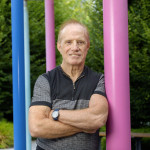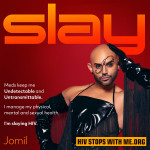I am 55 years old and was diagnosed with HIV in January 2002. I was diagnosed four months after the September 11 terrorist attacks, when I lost a brother who was at the Pentagon. I am one of the 15 ladies in the book Portraits of Inspiration. Upon learning of my brother’s untimely death, my mother chose me to represent the family, even though I have two older sisters. My portrait was a portrait of strength.
In the months following the attacks, I found myself getting sicker and sicker, and I didn’t know why. I went to the emergency room three times before I was asked if I had ever been tested for HIV. My answer was a strong “No,” simply because I am a lesbian and I’d only had sex with a couple guys prior to my diagnosis. As I dealt with the extreme stress of 9/11, I thought there was no way I could have HIV. But to my surprise, I received the news while in the hospital fighting pneumonia. Finding out this news after 9/11 almost drove me insane. I revealed my diagnosis to a few people, as the fear of stigma hit me immediately.
After leaving the hospital, I still had to represent my family. My family comes from a long line of pastors, ministers, evangelists, deacons, etc. I was covered in prayer but doubted my faith. How could I not? First my brother is killed in the terrorist attacks, then I get my diagnosis. I questioned where God was in all of this.
Fast-forward a couple of years to when I moved to Atlanta to be closer to my oldest sister and to find an infectious disease specialist. In the small town where I lived, there were only doctors who practiced internal medicine. While living in Atlanta, I learned as much as I could about HIV and AIDS. I gradually opened up to a few more family members.
After living in Atlanta for three years, I met a lady, and we started a relationship. There was a domestic incident where I was shot in the abdomen, so I moved back in with my mother in Hampton, South Carolina, in 2008. In 2010, I moved to Hilton Head Island. I began to meet different people through the agency where I was getting assistance with things like housing and direct medical care.
I eventually started telling my story across South Carolina and then across the country. I was approached at a USCA conference to be interviewed for a book. I was also one of three ladies featured on an app talking about how well the drug Kaletra worked for me. Right now, I’m pretty well known in South Carolina for telling my story. Whenever I speak at colleges, I talk about 9/11, domestic violence and HIV/AIDS. I have gotten numerous emails, letters and phone calls saying my story has impacted lives and served as an inspiration to others.
What three adjectives best describe you?
Inspiring, resilient, fun.
What is your greatest achievement?
Going back to college at the age of 46 and getting my degree in sociology.
What is your greatest regret?
Sleeping with a couple men to satisfy society and my strong Christian family.
What keeps you up at night?
Nothing.
If you could change one thing about living with HIV, what would it be?
I would have known I was positive sooner and would not have allowed myself to become ill with pneumonia.
What is the best advice you ever received?
My dad told me that my voice was going to be heard—not only from city to city, but from nation to nation. He told me that while I was in the hospital, and in 2012 my voice was heard.
What person in the HIV/AIDS community do you most admire?
Myself.
What drives you to do what you do?
The hope of being part of a community that educates the younger generation so they can make good decisions about sex, HIV and all that they entail.
What is your motto?
Tell your truth.
If you had to evacuate your house immediately, what is the one thing you would grab on the way out?
My dog and my purse.
If you could be any animal, what would you be? And why?
I would have to be an eagle, because they soar. Like me, figuratively!







1 Comment
1 Comment